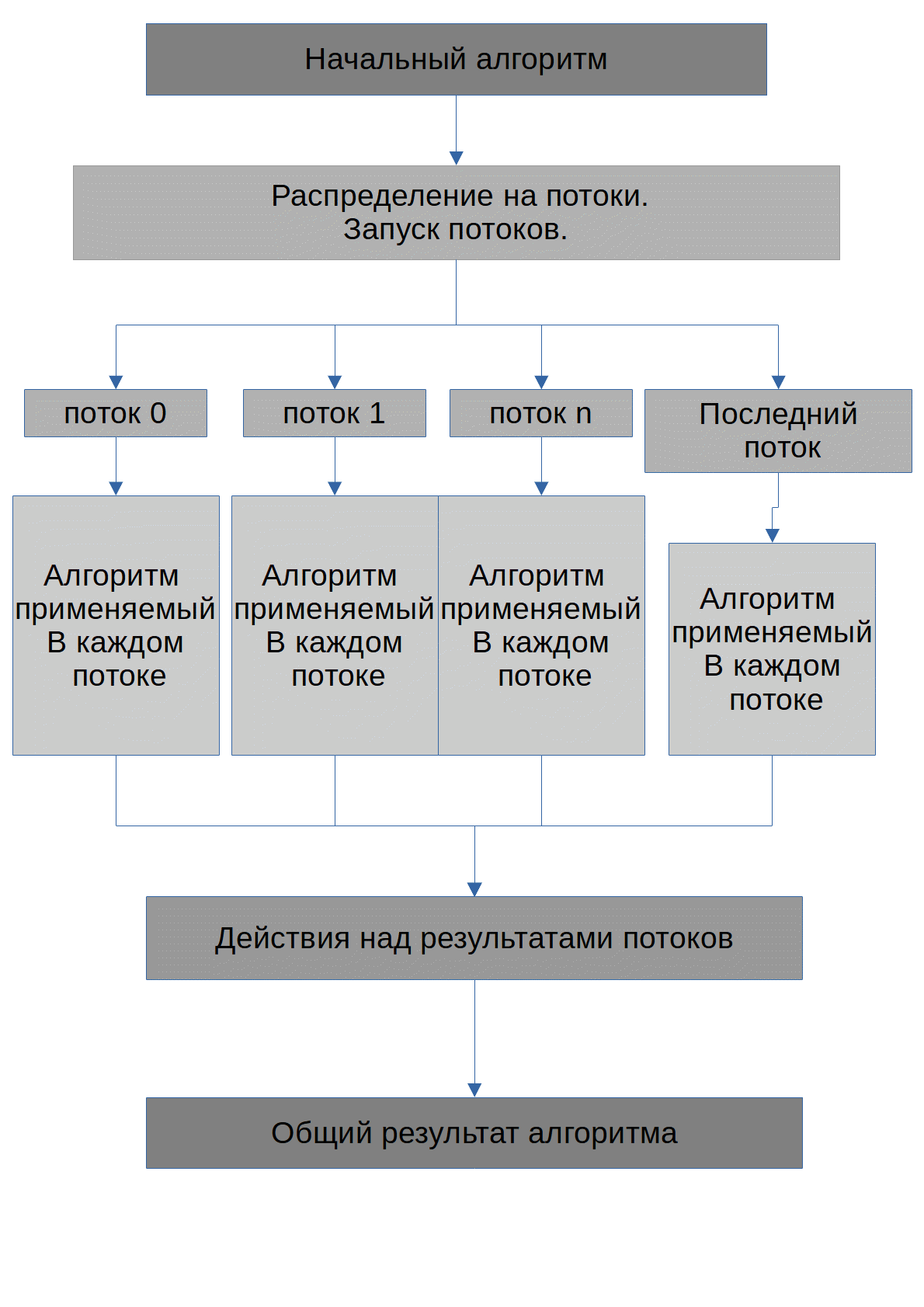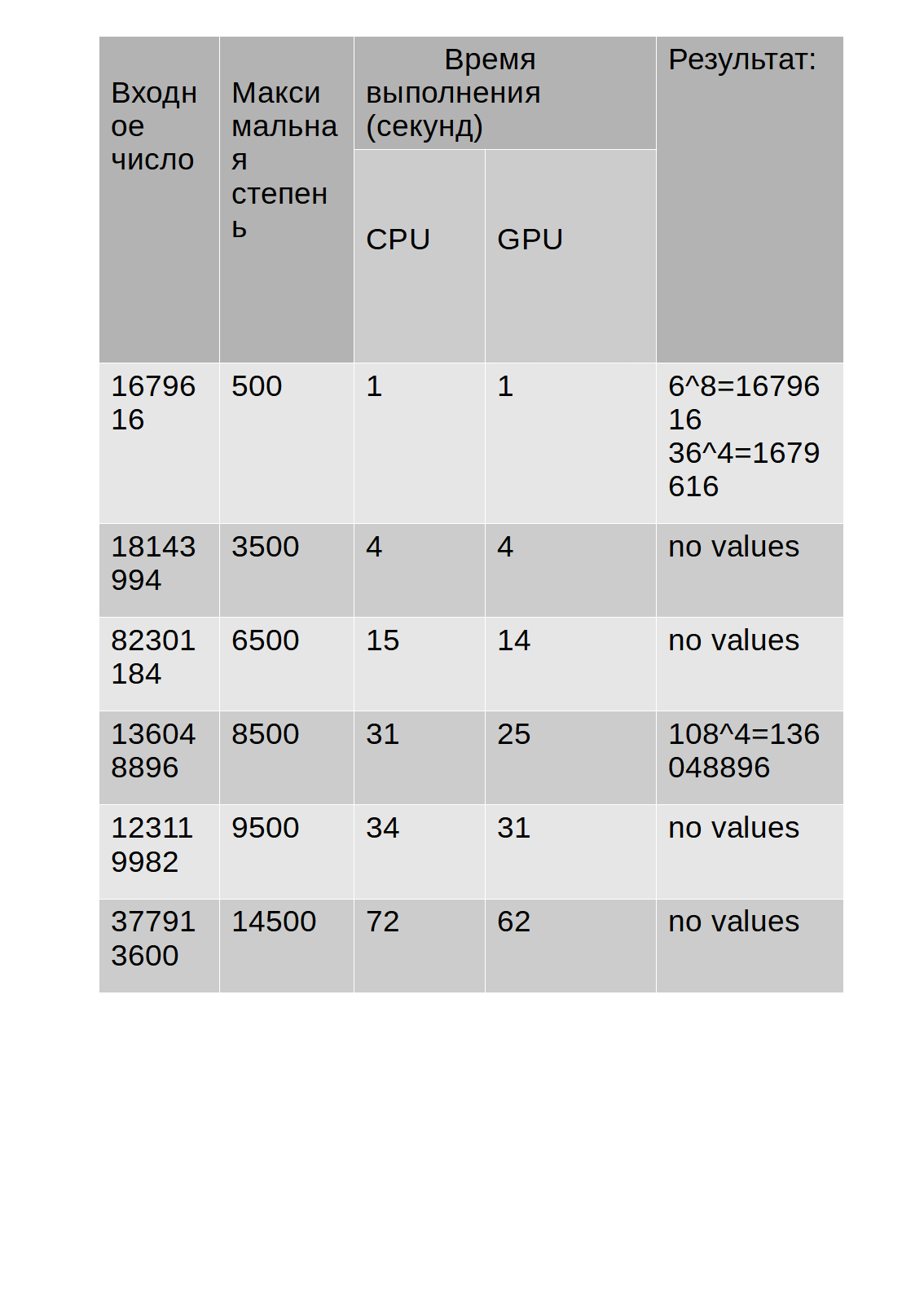Using the CUDA Runtime API for Computing. Comparison of CPU and GPU Computing
In this article, I decided to compare the execution of an algorithm written in C ++ on a CPU and a GPU (performing calculations using the Nvidia CUDA Runtime API on a supported Nvidia GPU). The CUDA API allows some calculations to be performed on the GPU. A c ++ file using cuda will have a .cu extension .
The algorithm is shown below.

The task of the algorithm is to find the possible numbers X, when raised to the degree degree_of, the initial number max_number will be obtained. I note right away that all numbers that will be transferred to the GPU will be stored in arrays. The algorithm executed by each thread looks like this:
int degree_of=2;
int degree_of_max=Number_degree_of_max[0];//
int x=thread;//
int max_number=INPUT[0];// ,
int Number=1;
int Degree;
bool BREAK=false;// while
while(degree_of<=degree_of_max&&!BREAK){
Number=1;
for(int i=0;i<degree_of;i++){
Number*=x;
Degree=degree_of;
}
if(Number==max_number){
OUT_NUMBER[thread]=X;//OUT_NUMBER Degree
OUT_DEGREE[thread]=Degree;// OUT_DEGREE X
}
degree_of++;
// :
if(degree_of>degree_of_max||Number>max_number){
BREAK=true;
}
}
Code to execute on CPU C ++. Cpp
#include <iostream>
#include<vector>
#include<string>// getline
#include<thread>
#include<fstream>
using namespace std;
int Running_thread_counter = 0;
void Upload_to_CPU(unsigned long long *Number, unsigned long long *Stepn, bool *Stop,unsigned long long *INPUT, unsigned long long *max, int THREAD);
void Upload_to_CPU(unsigned long long *Number, unsigned long long *Stepn, bool *Stop,unsigned long long *INPUT, unsigned long long *max, int THREAD) {
int thread = THREAD;
Running_thread_counter++;
unsigned long long MAX_DEGREE_OF = max[0];
int X = thread;
unsigned long long Calculated_number = 1;
unsigned long long DEGREE_OF = 2;
unsigned long long INP = INPUT[0];
Stop[thread] = false;
bool BREAK = false;
if (X != 0 && X != 1) {
while (!BREAK) {
if (DEGREE_OF <= MAX_DEGREE_OF) {
Calculated_number = 1;
for (int counter = 0; counter < DEGREE_OF; counter++) {
Calculated_number *= X;
}
if (Calculated_number == INP) {
Stepn[thread] = DEGREE_OF;
Number[thread] = X;
Stop[thread] = true;
BREAK = true;
}
DEGREE_OF++;
}
else { BREAK = true; }
}
}
}
void Parallelize_to_threads(unsigned long long *Number, unsigned long long *Stepn, bool *Stop,unsigned long long *INPUT, unsigned long long *max, int size);
int main()
{
int size = 1000;
unsigned long long *Number = new unsigned long long[size], *Degree_of = new unsigned long long[size];
unsigned long long *Max_Degree_of = new unsigned long long[1];
unsigned long long *INPUT_NUMBER = new unsigned long long[1];
Max_Degree_of[0] = 7900;
INPUT_NUMBER[0] = 216 * 216 * 216;
ifstream inp("input.txt");
if (inp.is_open()) {
string t;
vector<unsigned long long>IN;
while (getline(inp, t)) {
IN.push_back(stol(t));
}
INPUT_NUMBER[0] = IN[0];//
Max_Degree_of[0] = IN[1];//
}
else {
ofstream error("error.txt");
if (error.is_open()) {
error << "No file " << '"' << "input.txt" << '"' << endl;
error << "Please , create a file" << '"' << "input.txt" << '"' << endl;
error << "One read:input number" << endl;
error << "Two read:input max stepen" << endl;
error << "." << endl;
error.close();
INPUT_NUMBER[0] = 1;
Max_Degree_of[0] = 1;
}
}
// ,
//cout << INPUT[0] << endl;
bool *Elements_that_need_to_stop = new bool[size];
Parallelize_to_threads(Number, Degree_of, Elements_that_need_to_stop, INPUT_NUMBER, Max_Degree_of, size);
vector<unsigned long long>NUMBER, DEGREEOF;
for (int i = 0; i < size; i++) {
if (Elements_that_need_to_stop[i]) {
if (Degree_of[i] < INPUT_NUMBER[0] && Number[i] < INPUT_NUMBER[0]) {//
NUMBER.push_back(Number[i]);
DEGREEOF.push_back(Degree_of[i]);
}
}
}
// ,
//
/*
for (int f = 0; f < NUMBER.size(); f++) {
cout << NUMBER[f] << "^" << DEGREEOF[f] << "=" << INPUT_NUMBER[0] << endl;
}
*/
ofstream out("out.txt");
if (out.is_open()) {
for (int f = 0; f < NUMBER.size(); f++) {
out << NUMBER[f] << "^" << DEGREEOF[f] << "=" << INPUT_NUMBER[0] << endl;
}
out.close();
}
}
void Parallelize_to_threads(unsigned long long *Number, unsigned long long *Stepn, bool *Stop,unsigned long long *INPUT, unsigned long long *max, int size) {
thread *T = new thread[size];
Running_thread_counter = 0;
for (int i = 0; i < size; i++) {
T[i] = thread(Upload_to_CPU, Number, Stepn, Stop, INPUT, max, i);
T[i].detach();
}
while (Running_thread_counter < size - 1);//
}
For the algorithm to work, a text file with an initial number and maximum degree is required.
Code for doing GPU computation C ++. Cu
// cuda_runtime.h device_launch_parameters.h
// cyda
#include "cuda_runtime.h"
#include "device_launch_parameters.h"
#include<vector>
#include<string>// getline
#include <stdio.h>
#include<fstream>
using namespace std;
__global__ void Upload_to_GPU(unsigned long long *Number,unsigned long long *Stepn, bool *Stop,unsigned long long *INPUT,unsigned long long *max) {
int thread = threadIdx.x;
unsigned long long MAX_DEGREE_OF = max[0];
int X = thread;
unsigned long long Calculated_number = 1;
unsigned long long Current_degree_of_number = 2;
unsigned long long Original_numberP = INPUT[0];
Stop[thread] = false;
bool BREAK = false;
if (X!=0&&X!=1) {
while (!BREAK) {
if (Current_degree_of_number <= MAX_DEGREE_OF) {
Calculated_number = 1;
for (int counter = 0; counter < Current_degree_of_number; counter++) {
Calculated_number *=X;
}
if (Calculated_number == Original_numberP) {
Stepn[thread] = Current_degree_of_number;
Number[thread] = X;
Stop[thread] = true;
BREAK = true;
}
Current_degree_of_number++;
}
else { BREAK = true; }
}
}
}
cudaError_t Configure_cuda(unsigned long long *Number, unsigned long long *Stepn, bool *Stop,unsigned long long *INPUT, unsigned long long *max,unsigned int size);
int main()
{
int size = 1000;
unsigned long long *Number=new unsigned long long [size], *Degree_of=new unsigned long long [size];
unsigned long long *Max_degree_of = new unsigned long long [1];
unsigned long long *INPUT_NUMBER = new unsigned long long [1];
Max_degree_of[0] = 7900;
ifstream inp("input.txt");
if (inp.is_open()) {
string text;
vector<unsigned long long>IN;
while (getline(inp, text)) {
IN.push_back( stol(text));
}
INPUT_NUMBER[0] = IN[0];
Max_degree_of[0] = IN[1];
}
else {
ofstream error("error.txt");
if (error.is_open()) {
error<<"No file "<<'"'<<"input.txt"<<'"'<<endl;
error<<"Please , create a file" << '"' << "input.txt" << '"' << endl;
error << "One read:input number" << endl;
error << "Two read:input max stepen" << endl;
error << "." << endl;
error.close();
INPUT_NUMBER[0] = 1;
Max_degree_of[0] = 1;
}
}
bool *Elements_that_need_to_stop = new bool[size];
// cuda
cudaError_t cudaStatus = Configure_cuda(Number, Degree_of, Elements_that_need_to_stop, INPUT_NUMBER, Max_degree_of, size);
if (cudaStatus != cudaSuccess) {
fprintf(stderr, "addWithCuda failed!");
return 1;
}
vector<unsigned long long>NUMBER, DEGREEOF;
for (int i = 0; i < size; i++) {
if (Elements_that_need_to_stop[i]) {
NUMBER.push_back(Number[i]);//
DEGREEOF.push_back(Degree_of[i]);//
}
}
// ,
/*
for (int f = 0; f < NUMBER.size(); f++) {
cout << NUMBER[f] << "^" << DEGREEOF[f] << "=" << INPUT_NUMBER[0] << endl;
}*/
ofstream out("out.txt");
if (out.is_open()) {
for (int f = 0; f < NUMBER.size(); f++) {
out << NUMBER[f] << "^" << DEGREEOF[f] << "=" << INPUT_NUMBER[0] << endl;
}
out.close();
}
//
cudaStatus = cudaDeviceReset();
if (cudaStatus != cudaSuccess) {
fprintf(stderr, "cudaDeviceReset failed!");
return 1;
}
return 0;
}
cudaError_t Configure_cuda(unsigned long long *Number, unsigned long long *Degree_of, bool *Stop,unsigned long long *INPUT, unsigned long long *max,unsigned int size) {
unsigned long long *dev_Number = 0;
unsigned long long *dev_Degree_of = 0;
unsigned long long *dev_INPUT = 0;
unsigned long long *dev_Max = 0;
bool *dev_Elements_that_need_to_stop;
cudaError_t cudaStatus;
// GPU
cudaStatus = cudaSetDevice(0);
if (cudaStatus != cudaSuccess) {
fprintf(stderr, "cudaSetDevice failed! Do you have a CUDA-capable GPU installed?");
goto Error;
}
//
cudaStatus = cudaMalloc((void**)&dev_Number, size * sizeof(unsigned long long));
if (cudaStatus != cudaSuccess) {
fprintf(stderr, "cudaMalloc failed!dev_Number");
goto Error;
}
cudaStatus = cudaMalloc((void**)&dev_Degree_of, size * sizeof(unsigned long long));
if (cudaStatus != cudaSuccess) {
fprintf(stderr, "cudaMalloc failed!dev_Degree_of");
goto Error;
}
cudaStatus = cudaMalloc((void**)&dev_Max, size * sizeof(unsigned long long int));
if (cudaStatus != cudaSuccess) {
fprintf(stderr, "cudaMalloc failed!dev_Max");
goto Error;
}
cudaStatus = cudaMalloc((void**)&dev_INPUT, size * sizeof(unsigned long long));
if (cudaStatus != cudaSuccess) {
fprintf(stderr, "cudaMalloc failed!dev_INPUT");
goto Error;
}
cudaStatus = cudaMalloc((void**)&dev_Elements_that_need_to_stop, size * sizeof(bool));
if (cudaStatus != cudaSuccess) {
fprintf(stderr, "cudaMalloc failed!dev_Stop");
goto Error;
}
// GPU
cudaStatus = cudaMemcpy(dev_Max, max, size * sizeof(unsigned long long), cudaMemcpyHostToDevice);
if (cudaStatus != cudaSuccess) {
fprintf(stderr, "cudaMemcpy failed!");
goto Error;
}
cudaStatus = cudaMemcpy(dev_INPUT, INPUT, size * sizeof(unsigned long long), cudaMemcpyHostToDevice);
if (cudaStatus != cudaSuccess) {
fprintf(stderr, "cudaMemcpy failed!");
goto Error;
}
Upload_to_GPU<<<1, size>>>(dev_Number, dev_Degree_of, dev_Elements_that_need_to_stop, dev_INPUT, dev_Max);
//
cudaStatus = cudaGetLastError();
if (cudaStatus != cudaSuccess) {
fprintf(stderr, "addKernel launch failed: %s\n", cudaGetErrorString(cudaStatus));
goto Error;
}
// ,
cudaStatus = cudaDeviceSynchronize();
if (cudaStatus != cudaSuccess) {
fprintf(stderr, "cudaDeviceSynchronize returned error code %d after launching addKernel!\n", cudaStatus);
goto Error;
}
// GPU
cudaStatus = cudaMemcpy(Number, dev_Number, size * sizeof(unsigned long long), cudaMemcpyDeviceToHost);
if (cudaStatus != cudaSuccess) {
fprintf(stderr, "cudaMemcpy failed!");
goto Error;
}
cudaStatus = cudaMemcpy(Degree_of, dev_Degree_of, size * sizeof(unsigned long long), cudaMemcpyDeviceToHost);
if (cudaStatus != cudaSuccess) {
fprintf(stderr, "cudaMemcpy failed!");
goto Error;
}
cudaStatus = cudaMemcpy(Stop, dev_Elements_that_need_to_stop, size * sizeof(bool), cudaMemcpyDeviceToHost);
if (cudaStatus != cudaSuccess) {
fprintf(stderr, "cudaMemcpy failed!");
goto Error;
}
Error:// GPU
cudaFree(dev_INPUT);
cudaFree(dev_Degree_of);
cudaFree(dev_Max);
cudaFree(dev_Elements_that_need_to_stop);
cudaFree(dev_Number);
return cudaStatus;
}
Identifier
__global__ To work with the CUDA API, before calling the function, you need to reserve memory for the array and transfer the elements to the GPU memory. This increases the amount of code, but allows offloading the CPU, since the calculations are performed on the GPU. Therefore, cuda provides at least the opportunity to offload the processor for other workloads that do not use cuda.
In the case of the example on cuda, the processor's task is only to load instructions on the GPU and process the results from the GPU; While in the code for the CPU, the processor processes each thread. It is worth noting that cyda has limitations on the number of threads that can be launched, so in both algorithms I took the same number of threads equal to 1000. Also, in the case of the CPU, I used the variable
int Running_thread_counter = 0;to count the number of threads already executed and wait until all threads are executed.
Test configuration
CUDA GPU-Z
- CPU :amd ryzen 5 1400(4core,8thread)
- :8DDR4 2666
- GPU:Nvidia rtx 2060
- OS:windows 10 version 2004
- Cuda:
- Compute Capability 7.5
- Threads per Multiprocessor 1024
- CUDA 11.1.70
- GPU-Z:version 2.35.0
- Visual Studio 2017
CUDA GPU-Z
To test the algorithm, I used
the following C # code
, which created a file with initial data, then sequentially launched exe files of algorithms using CPU or GPU and measured the time of their operation, then entered this time and the results of the algorithms into the file result.txt . The windows task manager was used to measure the processor load .
using System;
using System.Collections.Generic;
using System.Linq;
using System.Text;
using System.Threading.Tasks;
using System.Diagnostics;
using System.IO;
namespace ConsoleAppTESTSTEPEN_CPU_AND_GPU_
{
class Program
{
static string Upload(Int64 number,Int64 degree_of)
{
string OUT = "";
string[] Chord_values = new string[2];
Int64 Degree_of = degree_of;
Int64 Number = number;
Chord_values[0] = Number.ToString();
Chord_values[1] = Degree_of.ToString();
File.WriteAllLines("input.txt", Chord_values);//
OUT+="input number:" + Number.ToString()+"\n";
OUT+="input degree of number:" + Degree_of.ToString()+"\n";
DateTime running_CPU_application = DateTime.Now;//
Process proc= Process.Start("ConsoleApplication29.exe");//exe c++ x64 CPU
while (!proc.HasExited) ;//
DateTime stop_CPU_application = DateTime.Now;//
string[]outs = File.ReadAllLines("out.txt");//
File.Delete("out.txt");
OUT+="CPU:"+"\n";
if (outs.Length>0)
{
for (int j = 0; j < outs.Length; j++)
{
OUT+=outs[j]+"\n";
}
}
else { OUT+="no values"+"\n"; }
OUT+="running_CPU_application:" + running_CPU_application.ToString()+"\n";
OUT+="stop_CPU_application:" + stop_CPU_application.ToString()+"\n";
OUT+="GPU:"+"\n";
// korenXN.exe x64 GPU
DateTime running_GPU_application = DateTime.Now;
Process procGPU = Process.Start("korenXN.exe");
while (!procGPU.HasExited) ;
DateTime stop_GPU_application = DateTime.Now;
string[] outs2 = File.ReadAllLines("out.txt");
File.Delete("out.txt");
if (outs2.Length > 0)
{
for (int j = 0; j < outs2.Length; j++)
{
OUT+=outs2[j]+"\n";
}
}
else { OUT+="no values"+"\n"; }
OUT+="running_GPU_application:" + running_GPU_application.ToString()+"\n";
OUT+="stop_GPU_application:" + stop_GPU_application.ToString()+"\n";
return OUT;//
}
static void Main()
{
Int64 start = 36*36;//
Int64 degree_of_strat = 500;//
int size = 20-5;//
Int64[] Number = new Int64[size];//
Int64[] Degree_of = new Int64[size];//
string[]outs= new string[size];//
for (int n = 0; n < size; n++)
{
if (n % 2 == 0)
{
Number[n] = start * start;
}
else
{
Number[n] = start * degree_of_strat;
Number[n] -= n + n;
}
start += 36*36;
Degree_of[n] = degree_of_strat;
degree_of_strat +=1000;
}
for (int n = 0; n < size; n++)
{
outs[n] = Upload(Number[n], Degree_of[n]);
Console.WriteLine(outs[n]);
}
System.IO.File.WriteAllLines("result.txt", outs);// result.txt
}
}
}
The test results are shown in the table:

As you can see from the table, the execution time of the algorithm on the GPU is slightly longer than on the CPU.
However, I note that during the operation of the algorithm using the GPU for calculations, the load by the CPU algorithm, displayed in the Task Manager, did not exceed 30%, while the algorithm using the CPU for calculations loaded it by 68-85%which in turn sometimes slowed down other applications. Also, below is a graph showing the difference in
execution time (Y-axis) of the CPU and GPU versus the input number (X-axis).
schedule


Then I decided to test with the processor loaded with other applications. The processor was loaded so that the test launched in the application did not take more than 55% of the processor's resources. The test results are shown below:

Schedule


As can be seen from the table, in the case of a loaded CPU, performing calculations on a GPU gives a performance increase, since a processor load of 30% falls within the 55% limit, and in the case of using a CPU for computations, its load is 68-85% , which slows down the algorithm if the CPU is loaded with other applications.
The reason why the GPU lags behind the CPU, in my opinion, may be that the CPU has a higher core performance (3400 MHz CPU, 1680 MHz GPU). In the case when the processor cores are loaded with other processes, the performance will depend on the number of threads processed over a certain time interval, and in this case the GPU will be faster, since it is able to simultaneously process more threads (1024 GPU, 8 CPU).
Therefore, we can conclude that using the GPU for computations does not necessarily have to give a faster operation of the algorithm, however, it can unload the CPU, which can play a role if it is loaded with other applications.
Resources:
- Cuda zone
- Cuda toolkit
- cuda
- Cuda toolkit documentation
- GPU